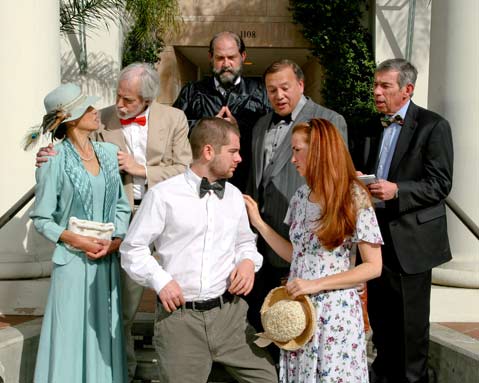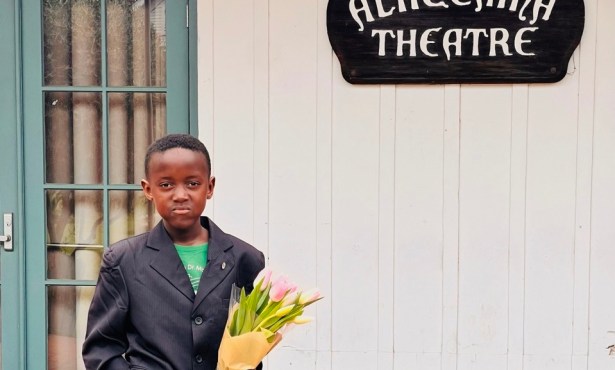Inherit the Wind
At Center Stage Theatre on Friday, February 12

Inherit the Wind, one of the most produced plays in the history of American theater, occupies an odd position in the repertoire. It’s at once an allegory of McCarthyism, as is Arthur Miller’s The Crucible, and a romanticized version of an actual historical event, the famed John T. Scopes “monkey” trial of 1925, in which a public school teacher was prosecuted for presenting evolution as part of a high school science class. Playwrights Jerome Lawrence and Robert E. Lee took the conflict between the spirit of enlightenment, as represented by defense attorney Clarence Darrow, and the reactionary views of fundamentalist Christianity, as embodied in prosecutor William Jennings Bryan, and turned them into a grand spectacle of speechifying, testifying, and even wooing, all under the hot sun of Tennessee.
As the Darrow figure, Henry Drummond, Ed Giron gives a confident and playful performance. He’s clearly having fun up there, especially in the lawyer’s big speeches. If some of the language crosses the line from fine writing into bluster, well, that comes with the territory. Drummond’s opponent in the courtroom is Matthew Harrison Brady, ably played by Bill Waxman as a true Southern gentleman of the old school. Drummond has more than just Brady to contend with though, as the trial takes place on the home turf of the Reverend Brown (William York Hyde), a fire and brimstone preacher who has a personal interest in ruining the life of the young schoolteacher on trial, one Bertram Cates (Alfred St. John Smith).
Lawrence and Lee’s chief liberty (there are several) with the source material resides in the love plot they invented for Bert Cates and Reverend Brown’s daughter Rachel (Stephanie Sivers). It’s a stretch to imagine that the Scopes trial should have adhered so closely to what has become best known as the “Footloose formula,” but it is still fun to watch Sivers and Smith suffering, sulking, and pouting their way through the rather wild proceedings of the trial.
The play is at its most fun in the second act, when the swiveling office chair that stands in for the witness box begins to revolve wildly. As with so many classic American plays from the last century, there’s a persistent undercurrent of barely contained farce that threatens to break through the serious surface at any moment. The judge bangs his gavel, he tells one of the lawyers they are “out of order,” and the witness spins in the chair once again. It all seems terribly contrived today, but at the time of its initial run, Inherit the Wind was the very height of theatrical fashion. This production, without offering any major revelations, nevertheless manages to communicate the sheer fun of the endless reversals and crises the beset the characters as they wobble towards an uncertain future. Perhaps most interesting of all from a cultural point of view is the reporter E. K. Hornbeck (Jerry Oshinsky), a stand-in for the famous contemporary social critic H. L. Mencken. His Sophistication (with a capital “S”) marks him out as a harbinger of things to come, both for the country and for the writing team, who went on to compose the classic drama of encoded gay liberation, Auntie Mame.



